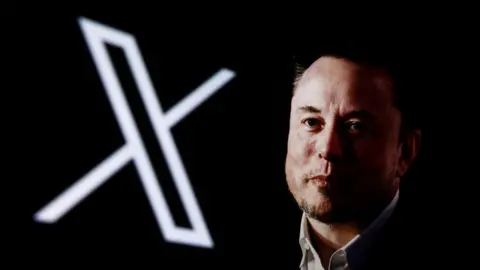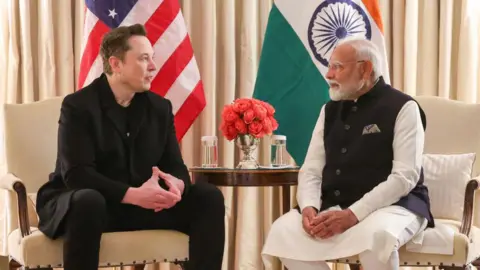Musk's X is suing India, as Tesla and Starlink plan entry
 Getty Images
Getty ImagesAn Indian court is due to hear a lawsuit filed by Elon Musk's social media company X, accusing Prime Minister Narendra Modi's government of misusing the law to censor content on its platform.
Last month, X sued the government saying a new website - Sahyog - launched by the federal home ministry last year, was being used to expand its censorship powers and take down content.
X argued the portal gave government officials wide-ranging powers to issue blocking orders that were "in violation" of India's digital laws. It said it could not be compelled to join Sahyog, which it called a "censorship portal".
The Indian government has said that the portal is necessary to tackle harmful online content.
Other American technology giants such as Amazon, Google and Meta have agreed to be on Sahyog.
Sahyog describes itself as a portal developed to automate the process of sending government notices to content intermediaries like X and Facebook.
The lawsuit filed in the southern state of Karnataka came after the federal railway ministry ordered X to remove "hundreds of posts".
These included videos of a crush in Delhi in which 18 people died as they were making their way to the world's largest religious gathering, the Kumbh Mela.
In its petition, X argues that the portal and the orders issued through it fall outside the remit of the original law that allows the government to block content.
Under this law, senior officials have the power to issue takedown orders, but after following due procedure like giving notices, opportunities for hearings and allowing for a review of any decision.
But X says the government is bypassing these procedures to issue arbitrary content takedown orders through other legal provisions that have no safeguards.
As a result, "countless" government officials, including "tens of thousands of local police officers", are "unilaterally and arbitrarily" issuing orders, X argues in its petition.
India's federal IT and home ministries did not respond to the BBC's request for comment.
In court, the government has argued that its actions are lawful. It said it was not sending blocking orders but only issuing "notices" to platforms against unlawful content.
The government also defended the Sahyog platform saying it was a "necessity" because of the "growing volume of unlawful and harmful content online".
 Getty Images
Getty ImagesThe case is of "vital importance" as the blocking mechanism of the Sahyog portal has resulted in "a wholesale increase in censorship", said Apar Gupta of the digital rights organisation, Internet Freedom Foundation.
This is not the first time the Indian government and X are at loggerheads.
The Delhi police had raided the offices of X (then Twitter) in 2021, before Musk took over, after a tweet by a ruling party spokesperson was marked as "manipulated media".
In 2022, the company had sued the Indian government against blocking orders, at least one of which pertained to a year-long protest by farmers against new laws brought in by the government. However, the court ruled against the company and imposed a fine of 5m rupees ($58,000; £45,000).
Under Musk's leadership, X appealed against this decision, which is currently separately being heard in the Karnataka high court.
In 2023, India called X a "habitual non-compliant platform" during the appeal proceedings.
India is also reportedly investigating X's chatbot Grok regarding its use of inappropriate language and "controversial responses" after it made politically sensitive comments to user prompts recently.
The timing of the lawsuit is interesting as it comes when Musk's other companies Starlink and Tesla have just begun making inroads into India with their business plans.
Earlier in March, Starlink signed an agreement with two of India's biggest telecoms firms to bring satellite internet to India and is awaiting government approval to start providing its services.
Tesla could finally be making its debut and has begun hiring for a dozen jobs in Delhi and Mumbai. It is also reportedly hunting for showrooms in both cities.
Musk also met Prime Minister Modi when he visited the White House last month.
His growing business interests in India and closeness with US President Donald Trump give him "ample leverage" with India, Michael Kugelman, director of the Wilson Centre's South Asia Institute in Washington, told the BBC.
"This means he has a lot of leeway in terms of how he operates, including making a decision to sue the Indian government," he added, saying the case might not hurt Musk's business prospects in the country.
Follow BBC News India on Instagram, YouTube, Twitter and Facebook.
